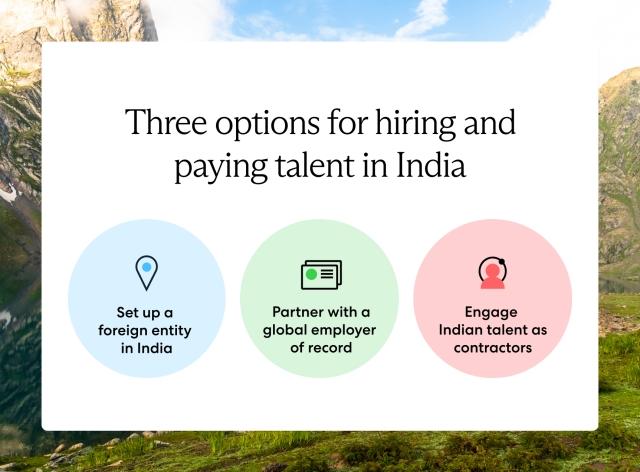India is a top resource for U.K. companies looking to expand globally and source highly skilled, English-speaking talent at a low-cost advantage.
Before entering this market, U.K. companies must exercise due diligence to ensure compliance. Navigating employment and tax regulations, such as worker classification and permanent establishment laws, exposes foreign companies to serious risks.
This guide covers everything you need to know about engaging Indian talent from the U.K. Learn how to calculate total employee cost, mitigate risk, and navigate local employment laws as you build an Indian workforce. Plus, find out how to hire employees in India without establishing a legal entity.
Can a foreign company hire employees in India?
Yes, a foreign company can hire employees in India. By establishing a local business entity, partnering with an employer of record (EOR), or engaging Indian contractors, global companies can compliantly engage Indian talent and enjoy the many lucrative business opportunities this market has to offer.
How can I legally hire an employee in India?
Global companies have three options for legally hiring employees in India: establishing a legal entity, partnering with an employer of record (EOR), or engaging Indian contractors. Each approach offers unique advantages regarding cost, flexibility, and risk exposure. The best option for your business depends on your long-term goals in the Indian market.
We discuss each approach in detail below.

Set up a legal entity in India
Entity establishment is the traditional approach to expanding internationally and building a global workforce. With a legal entity in India, you can set up a local branch and hire talent directly.
This approach reduces hiring costs and gives you complete control over employment logistics, from hiring and onboarding to running local payroll. Still, entity establishment involves added risk as it leaves you responsible for ensuring compliance with local employment and tax regulations.
Entity establishment in India is also time-consuming and costly, requiring at least a £20,000 initial investment plus ongoing annual maintenance fees. With this approach, you also have to wait several months before you can legally engage local talent.
Entity establishment makes sense if you are ready to invest long-term in the Indian market and plan to hire a large team. However, if you’re not ready to undergo incorporation and invest in physical assets, consider partnering with an employer of record (EOR) instead.
Partner with an employer of record (EOR)
An EOR is a third-party entity with international infrastructure that makes it easy for global companies to quickly and compliantly hire talent worldwide.
By serving as the legal employer of your global workforce, an EOR eliminates the need for entity establishment in each of your target markets while ensuring compliance along the way.
An EOR handles everything from hiring, onboarding, immigration, and compliance to running global payroll, administering global benefits, and offering ongoing HR support on your behalf.
Meanwhile, you maintain control over day-to-day management tasks, such as compensation, position duties, and performance management.
Partnering with an Indian EOR offers U.K. companies a quick, lean, and flexible approach to building a distributed workforce in India, allowing you to test the waters of the local market before making long-term investments.
Learn more: What Is an Employer of Record (EOR)?
Engage contractors in India
A third option for engaging talent in India is to hire local contractors.
By hiring contractors, U.K. companies can source Indian talent with specialized skills for one-off projects while saving time and resources they would otherwise invest in hiring, onboarding, and paying full-time employees. However, this approach involves misclassification risk.
It’s relatively easy for foreign employers to unknowingly misclassify their Indian contractors. As work dynamics change and local regulations evolve, U.K. companies can unknowingly overstep the boundaries of their contractor-client relationship and face hefty penalties.
Consider the following example: a foreign employer hires an Indian worker and correctly classifies them as a contractor at the start of their working relationship. Over time, the employer starts influencing the contractor’s work schedule and provides them with work equipment.
According to local regulations, this constitutes an employment relationship and subjects the employer to fines, employee backpay, tax arrears, and extensive litigation.
We discuss this topic in greater detail later on.
Learn more: Should You Hire a Contractor or Employee?
How much does it cost to hire an employee in India?
The cost of hiring an employee in India is at least 16.75% of the employee’s base salary because the employer must contribute 12% of the employee’s base salary to the Employees’ Provident Fund (EPF) and 4.75% to the Employees’ State Insurance (ESI).
Interested in hiring employees in India? Use our employee cost calculator below to get reliable insights into employee costs and payroll contributions in India:
Employment laws to know before hiring employees in India
Before hiring employees in India, U.K. companies should familiarize themselves with local employment regulations. This is critical for ensuring compliance, retaining talent, and avoiding noncompliance penalties as you build a distributed workforce across the country.
Below, we list the employment laws that all foreign companies operating in the Indian market should know:
- Minimum wage. The national floor-level minimum wage in India is INR 176 per day (£1.69); however, the effective minimum wage varies between states depending on working conditions, living costs, and the nature of work.
- 13th-month pay. All factories and any establishment employing at least 20 people must offer all employees earning INR 21,000 (£199) per month or less an annual bonus worth 8.33% to 20% of their base salary.
- Overtime. A standard workweek in India is 48 hours per week. Employees receive 200% of their standard wage for overtime.
- Paid time off. Federal regulations guarantee all employees 15 days of paid annual leave.
- Sick leave. Most employees receive roughly 10 days of paid sick leave, depending on the state where they work.
- Maternity leave. Employees with fewer than two children receive 26 weeks of paid maternity leave, while employees with two or more children receive 12 weeks. Employees of newly adopted children also receive 12 weeks.
- Paternity leave. Public sector employees receive 15 days of paid paternity leave. Federal regulations don’t mandate paternity leave for private-sector employees.
- Public holidays. Employees enjoy roughly 10 paid annual public holidays, depending on the state where they work, plus paid time off to vote in elections.
Compliance risks to avoid when hiring employees in India
In addition to familiarizing themselves with Indian employment regulations, U.K. companies must also understand the compliance risks associated with each aspect of the law.
For instance, the floor-level national minimum wage is INR 176 (£1.67) per day. However, foreign companies in this market must also familiarize themselves with state and industry-level minimum wage protections to ensure compliance.
The primary risks U.K. employers face when hiring employees in India involve worker classification, employment law variances, payroll tax regulations, and permanent establishment.
We discuss each of these in detail below and offer tips for mitigating risk.
Misclassification
Worker classification refers to how you designate talent—as employees or contractors. While this concept is relatively straightforward, ensuring compliance with highly nuanced federal regulations is challenging for foreign employers and creates a serious misclassification risk.
Employees in India enjoy various protections under federal law, such as access to public healthcare, retirement insurance, and minimum wage guarantees. While contractors in India don’t have the same rights, they enjoy other unique protections.
Unlike employees, Indian contractors can work for multiple clients at a time, hire additional help, and choose their own work schedules. Any client that infringes upon these rights subjects themself to misclassification penalties, including employee backpay, benefits arrears, back taxes, and extensive litigation.
The following factors determine worker classification in India:
- Subordination
- Financial independence
- Risk responsibility
- Permanency
It’s relatively easy for U.K. companies to unknowingly misclassify talent. If you control when and how a contractor does their job, offset a contractor’s job-related financial losses, or maintain an indefinite relationship with a contractor, they are an employee.
To ensure compliance, U.K. companies operating in this market must conduct regular audits to stay abreast of local regulations and changing workplace dynamics.
Many foreign organizations doing business in India partner with a local legal expert, like an EOR, to handle worker classification on their behalf.
Read more in our complete guide to employee misclassification.
Varying employment laws
One of the most challenging aspects of building a global workforce is navigating employment regulations at federal, state, and local levels in each country where you hire talent.
India has 28 different states, each with its own employment regulations, ranging from paid annual leave and public holidays to minimum wage and termination. For instance, the minimum wage for skilled workers in Delhi is INR 816 (£7.75) per day, while in Punjab, it’s INR 477.75 (£4.54).
Employers in Delhi may terminate an employment contract with one month’s written notice after an employee has worked for the organization for at least three months. However, in Telangana, employers must wait six months before terminating an employee without cause.
Before onboarding employees in India, U.K. companies must familiarize themselves with the employment regulations in each state where they hire talent. Consider partnering with a local legal expert with experience navigating state-level employment regulations to avoid fines, limited business opportunities, and other penalties.
Incorrect payroll contributions
Running compliant international payroll always poses a unique compliance risk for global companies with distributed teams. Despite a few similarities, India’s statutory benefits requirements differ greatly from those in the U.K.
For instance, India’s Employees’ State Insurance (ESI) fund provides similar benefits as the U.K.’s social security system. However, total employer and employee contribution rates to the ESI amount to only 6.5%.
Statutory payroll tax and contributions in India comprise the following programs:
- Employee Provident Fund (EPF). The EPF is an interest-bearing savings fund that employees can only access under specific circumstances, such as when purchasing a house, repaying a loan, or pursuing higher education. Employees and employers each contribute 12% to the EPF.
- Employees’ State Insurance (ESI). This fund covers medical insurance, upskill training, unemployment allowance, disability, and financial support for dependants if an employee passes away. Employers contribute 4.75%, while employees contribute 1.75%.
- Health and education cess. This is a 4% levy that supports the education and healthcare needs of rural communities in India living below the poverty line. Employers calculate the cess based on the employee’s income tax rather than their monthly earnings.
Income taxes in India range from 0% to 30%, depending on the employee’s tax bracket.
All employers in India must calculate income taxes and statutory contributions as percentages of their employee’s gross monthly earnings and withhold and remit payments to the federal government.
Ensuring accurate payments when running payroll for your Indian workforce is critical for reducing employee churn and avoiding noncompliance penalties.
Learn more: An Overview of Payroll Taxes in India
Permanent establishment
Any foreign company operating in India risks triggering permanent establishment (PE) status and facing a local corporate tax liability.
PE regulations vary between countries. However, they generally state that any foreign organization conducting ongoing revenue-generating activities from a fixed place of business in the local market is a PE and must pay local corporate taxes.
According to federal regulations, any foreign company that wholly or partly carries out business activities in India via a physical location, such as a licensed office, is a PE. In other words, you must operate from a physical location in the country to qualify as a PE.
However, federal regulations also state that any independent agent who regularly exercises the authority to close contracts, deliver goods, or secure orders on behalf of a foreign organization is also a PE.
With such ambiguities in the local corporate tax regulations, U.K. employers often struggle to clarify their PE status when engaging talent in India. To avoid back taxes, fines, and a damaged business reputation, familiarize yourself with India’s permanent establishment regulations and clarify your local corporate tax liability before hiring employees in this market.
The most reliable way to mitigate PE risk in India is to partner with a local legal entity specializing in Indian corporate tax law.
Compliantly hire employees in India with Velocity Global
Hiring talent in India opens up a world of opportunity for U.K. companies, but it comes with unique compliance risks. Eliminate the risk and streamline your hiring efforts by partnering with Velocity Global.
Velocity Global’s EOR solution makes it easy for U.K. companies to quickly and compliantly hire talent in over 185 countries, including India, while forgoing entity establishment and ensuring compliance with local employment regulations.
We handle everything from hiring, onboarding, and immigration to running global payroll, administering global benefits, and offering ongoing HR support to your international team on your behalf.
From crafting locally tailored benefits to offering streamlined virtual onboarding, we handle the heavy lifting associated with hiring Indian talent from abroad so U.K. companies can easily tap into this lucrative market.
Contact Velocity Global today to get started.



